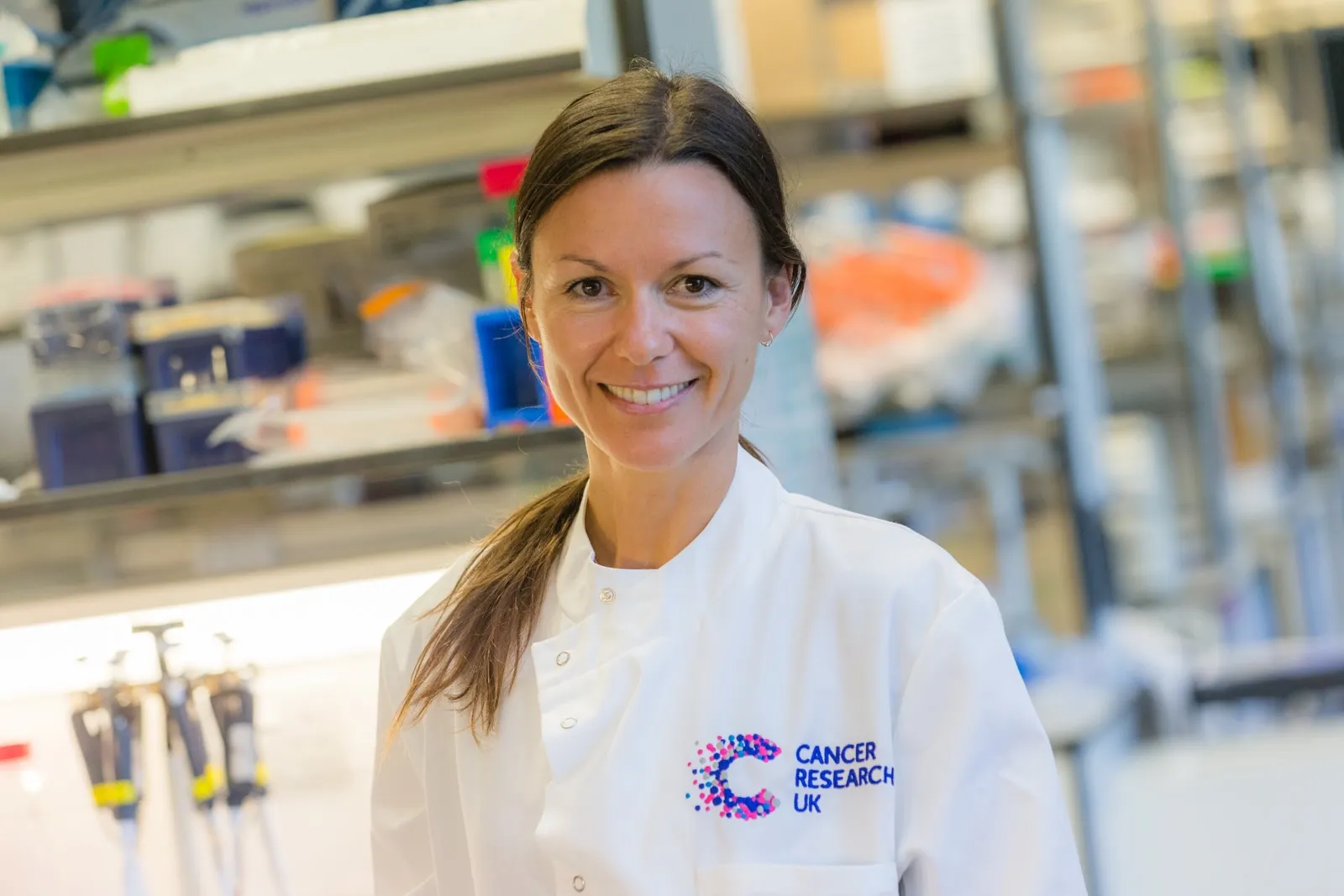Alejandra Bruna
Go Back
Dr. Alejandra Bruna is an accomplished researcher with a diverse and distinguished background in cancer biology and preclinical modelling. Her academic journey began with a Bachelor of Arts degree in Pharmacy from the University of Barcelona in 1998, followed by a successful completion of her PhD in Biochemistry and Molecular Biology from the same institution in 2003. Throughout her career, Dr. Bruna has held key positions in renowned institutions across the globe. Currently she is a Team Leader at The Institute of Cancer Research (ICR) in London, leading the Preclinical Modelling of Paediatric Cancer Evolution team. Before her current role, Dr. Bruna spent nearly a decade as an integral part of Cancer Research UK, Cambridge, where she served as an Associate Scientist from 2011 to 2020. Prior to that, she held the position of Senior Postdoctoral Fellow at both the University of Cambridge and Cancer Research UK from 2008 to 2011. Her international research experience includes postdoctoral positions at Vall d’Hebron University Hospital Research Institute in Barcelona, Spain, and Mount Sinai School of Medicine in New York City, USA, from 2005 to 2007 and 2003 to 2005, respectively. Dr. Bruna’s commitment to advancing cancer research is evident through her numerous awards, including the prestigious Marie Curie-Career Development Award (FP7-People-EIF-2008), Cancer Research UK Post-doctoral Fellowship, AECC Post-doctoral Fellowship, and Spanish Ministry of Science and Technology Fellowships during her postdoctoral and predoctoral years. In her personal statement, Dr. Bruna highlights her work in developing one of the largest biobanks of breast cancer patient-derived tumour xenografts (PDX) and pioneering cost-effective drug development approaches. Notably, she led the implementation of an Avatar study, a critical step in the integration of PDXs into real-time clinical decision-making processes. Motivated by the unmet clinical needs in high-risk paediatric tumours, Dr. Bruna shifted her focus to paediatric oncology, joining the Centre for Paediatric Oncology Experimental Medicine and the Centre of Evolution and Cancer at the ICR. Her current research involves cancer evolutionary studies, using experimental evolution and innovative single-cell techniques in pre-clinical mouse and human-derived cancer models. Dedicated to unravelling the molecular mechanisms underlying disease progression, Dr. Bruna and her team passionately work towards developing kinder and smarter treatments for paediatric cancers. Her biographical sketch reflects a commitment to excellence, leadership, and advancing scientific knowledge in the field of cancer research.
Relevant Publications
- Shea, Abigail; Eyal-Lubling, Yaniv; Guerrero-Romero, Daniel; Manzano Garcia, Raquel; Greenwood, Wendy; O’Reilly, Martin; Georgopoulou, Dimitra; Callari, Maurizio; Lerda, Giulia; Wix, Sophia; Y Eyal-Lubling, et al. (Bruna A # senior) bioRxiv 2023.01.10.523259; doi:https://doi.org/10.1101/2023.01.10.523259
- Wild SA, Cannell IG, Nicholls A, Kania K, Bressan D; CRUK IMAXT Grand Challenge Team (Bruna A part of the IMAXT Grand Challenge Team); Hannon GJ, Sawicka K. Clonal transcriptomics identifies mechanisms of chemoresistance and empowers rational design of combination therapies. Elife. 2022 Dec 16;11:e80981. doi: 10.7554/eLife.80981.
- Groelly FJ, Porru M, Zimmer J, Benainous H, De Visser Y, Kosova AA, Di Vito S, Serra V, Ryan A, Leonetti C, Bruna A, Biroccio A, Tarsounas M. Anti-tumoural activity of the G-quadruplex ligand pyridostatin against BRCA1/2-deficient tumours. EMBO Mol Med. 2022 Mar 7;14(3):e14501. doi: 10.15252/emmm.202114501. Epub 2022 Feb 2.
- Nguyen LC, Naulaerts S, Bruna A, Ghislat G, Ballester PJ. Predicting Cancer Drug Response In Vivo by Learning an Optimal Feature Selection of Tumour Molecular Profiles. Biomedicines. 2021 Sep 26;9(10):1319. doi: 10.3390/biomedicines9101319.
- M Tognetti, A Gabor, M Yang, V Cappelletti, J Windhager, OM Rueda, K Charmpi, E Esmaeilishirazifard, Bruna A, N de Souza, C Caldas, A Beyer, P Picotti, J Saez-Rodriguez, B Bodenmiller. Deciphering the signaling network of breast cancer improves drug sensitivity prediction. Cell Systems 2021 12 (5), 401-418. e12
- Georgopoulou D, Callari M, Rueda OM, Shea A, Martin A, Giovannetti A, Qosaj F, Dariush A, Chin SF, Carnevalli LS, Provenzano E, Greenwood W, et al Bruna A (*co-senior). Landscapes of cellular phenotypic diversity in breast cancer xenografts and their impact on drug response. Nat Commun. 2021 Mar 31;12(1):1998. doi: 10.1038/s41467-021-22303-z.
- Ros S, Wright AJ, D’Santos P, Hu DE, Hesketh RL, Lubling Y, Georgopoulou D, Lerda G, Couturier DL, Razavi P, Pelossof R, Batra AS et al. (Bruna A # 22). Metabolic Imaging Detects Resistance to PI3Kα Inhibition Mediated by Persistent FOXM1 Expression in ER(+) Breast Cancer. Cancer Cell. 2020 Oct 12;38(4):516-533.e9. doi: 10.1016/j.ccell.2020.08.016. Epub 2020 Sep 24.
- Bruna A, Rueda OM, Greenwood W, Batra AS, Callari M, Batra RN, Pogrebniak K, Sandoval J, Cassidy JW, Tufegdzic-Vidakovic A, Sammut SJ, et al. A Biobank of Breast Cancer Explants with Preserved Intra-tumor Heterogeneity to Screen Anticancer Compounds. Cell. 2016 Sep 22;167(1):260-274.e22. doi: 10.1016/j.cell.2016.08.041. Epub 2016 Sep 15.
- Tufegdzic Vidakovic A, Rueda OM, Vervoort SJ, Sati Batra A, Goldgraben MA, Uribe-Lewis S, Greenwood W, Coffer PJ, Bruna A and Caldas C (*co-senior). Context-Specific Effects of TGF-β/SMAD3 in Cancer Are Modulated by the Epigenome. Cell Rep. 2015 Dec 22;13(11):2480-2490. doi: 10.1016/j.celrep.2015.11.040. Epub 2015 Dec 10.
- Bruna A, Greenwood W, Le Quesne J, Teschendorff A, Miranda-Saavedra D, Rueda OM, Sandoval JL, Vidakovic AT, Saadi A, Pharoah P, Stingl J, Caldas C. TGFβ induces the formation of tumour-initiating cells in claudinlow breast cancer. Nat Commun. 2012;3:1055. doi: 10.1038/ncomms2039.